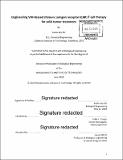Engineering VHH-based chimeric antigen receptor (CAR) T cell therapy for solid tumor treatment
Author(s)
Xie, Yushu Joy.
Download1127385442-MIT.pdf (16.13Mb)
Alternative title
Engineering Volatile Halogenated Hydrocarbons-based chimeric antigen receptor (CAR) T cell therapy for solid tumor treatment
Other Contributors
Massachusetts Institute of Technology. Department of Biological Engineering.
Advisor
Hidde L. Ploegh.
Terms of use
Metadata
Show full item recordAbstract
Chimeric antigen receptor (CAR) T cells are a promising cancer therapeutic, as they can specifically redirect the cytotoxic function of a T cell to a chosen target of interest. CAR T cells have been successful in clinical trials against hematological cancers, but have experienced low efficacy against solid tumors for a number of reasons, including a paucity of tumor-specific antigens to target and a highly immunosuppressive solid tumor microenvironment. In chapter 2 of this thesis, we develop a strategy to target multiple solid tumor types through markers in their microenvironment. The use of single domain antibody (VHH)-based CAR T cells that recognize these markers circumvents the need for tumor-specific targets. Chapter 3 will describe methods to overcome the immunosuppressive microenvironment of solid tumors. Here, we have developed VHH-secreting CAR T cells that can modulate additional aspects of the tumor microenvironment, including the engagement of the innate immune system through secretion of a VHH against an inhibitor of phagocytosis. We show that this strategy of VHH-secretion by CAR T cells can lead to significant benefits in outcome. We also demonstrate that delivery of therapeutics by CAR T cells can improve the safety profile of the therapeutic. Chapter 4 of this thesis explores strategies to increase the targeting capacity of CAR T cells by building logic-gated CARs. Finally, chapter 5 will describe work in imaging CAR T cells specifically, longitudinally, and non-invasively through PET imaging. Our results demonstrate the flexibility of VHHs in CAR T cell engineering and the potential of VHH-based CAR T cells to target the tumor microenvironment, modulate the tumor microenvironment, and treat solid tumors.
Description
Thesis: Ph. D., Massachusetts Institute of Technology, Department of Biological Engineering, 2019 Cataloged from PDF version of thesis. Includes bibliographical references.
Date issued
2019Department
Massachusetts Institute of Technology. Department of Biological EngineeringPublisher
Massachusetts Institute of Technology
Keywords
Biological Engineering.